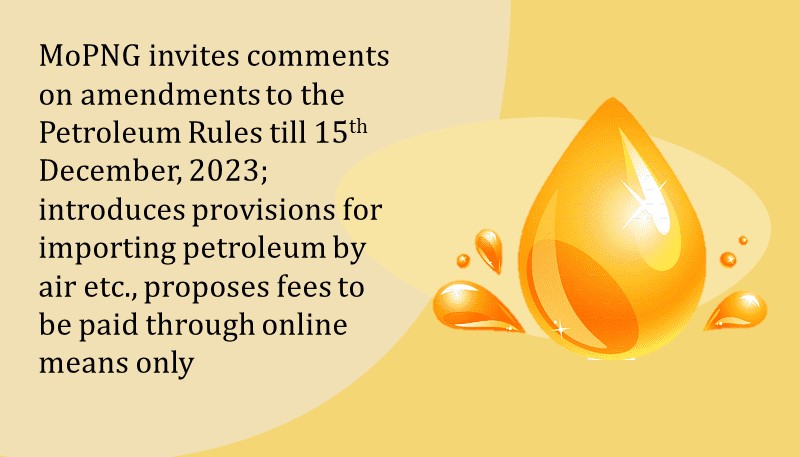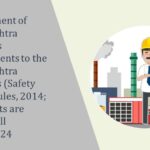The Ministry of Petroleum and Natural Gas (MoPNG) has proposed amendments to the Petroleum Rules, 2002 by way of rolling out the Petroleum (Amendment) Rules, 2023 (“Draft Rules”). The Draft Rules propose to amend the restriction on import and transport of petroleum, petroleum tank testing requirements and include regulations with respect to “ISO Tank Container”, “ISO Tank Container Framework”. Further, it proposes that fees must be paid only through online means. Objections and Suggestions are invited till 15th December, 2023 and may be addressed to the Joint Secretary (M&OR), Ministry of Petroleum and Natural Gas, New Delhi-110001 or sent by email at: js.mkt-png@gov.in.
Key Highlights:
- Introduction of a “Third Party Inspection Agency (TPIA)” – a professional organisation recognized by Chief Controller or Controller to carry out testing and certification under Petroleum Rules including safety audit of major accident hazards (MAH) premises as defined under the Manufacture, Storage and Import of hazardous Chemicals Rules, 1989. The qualifications and experience of this Agency will be as applicable to the competent persons as provided under the revised Form XX in the Draft Rules.
- Petroleum Rules, 2002 shall not apply to containers containing petroleum imported for the purposes of research and development, if the packing conforms to International Air Transport Association (IATA) Dangerous Goods Regulations as amended from time to time.
- Fees under the Petroleum Rules, 2002 is to be paid through e-payment or through Non-Tax Receipt Portal instead of by a crossed bank draft of a nationalised or scheduled bank drawn in favour of the Chief Controller of Explosives, payable at Nagpur or through e-payment.
- Regulations for importing and transporting of ISO Tank Containers has been introduced. Import permission from the Chief Controller or Controller is required for importing and transporting of ISO Tank Containers. The Draft Rules define ISO tank containers to be petroleum freight container that is secured by twister locks and is suitable for carriage of liquid petroleum. Import permission for importing ISO Tank Container is required to be personally furnished or through his agent to the Commissioner of Customs. Further, the ISO tank container framework and/ or the ISO tank container will be tested after each repair as laid down in the code of fabrication. Permission from Chief Controller or Controller is required before transporting petroleum Class A or B by road in the ISO tank container.
- Regulation for importing of petroleum by air has been introduced. Petroleum can only be imported by air at authorized airports. The following documents are required to be furnished to Commissioner of Customs for importing petroleum by air and prior permission is required by the Commissioner for unloading petroleum:
- Declaration and certificate of storage accommodation;
- Licence for importing and storing such petroleum to the Commissioner of Customs;
- Landing permit from the Director General of Civil Aviation; and
- Consent letter from respective flight operator for transportation of petroleum by air.
- The pipelines used for transport of petroleum can be constructed of suitable steel or any other suitable materials approved by the Chief Controller, which is safe for the conditions under which it is to be used.
- The standards to be maintained for fixed electric apparatus which can be installed in the hazardous area where petroleum is stored, refined, blended or handled has been updated.
- Certificate for engineering any electric circuit and any electric apparatus in hazardous area for the first time and after each repair maintenance or alteration work carried out in such circuit or apparatus, has to be issued by a competent person, who is an electric engineer.
- The scale of firefighting provided on other areas of new/upcoming installation where petroleum is stored has to be as per OISD Standard 244. Installations with petroleum which has already approved by the Chief Controller will be governed by the OISD Standard 117.
- A tank or receptacle for storage of petroleum in bulk has to be constructed as per ASTM D3299-18, BS EN 13121-3, UL1316.
- The recognition of a person who wants to be recognized as competent person or a TPIA will be granted for a period of five years and may be renewed for every three years basis performance report and submission of the medical fitness certificate by a registered medical practitioner recognized by Medical Council of India, until the competent person or TPIA attains the age of 65 year.
- A “No Objection Certificate” is not required from District Authority for receiving a license to store petroleum in tank or tanks, in connection with pump outfit for fueling motor conveyances in the site proposed if the same is a part of the CNG station licensed under Gas Cylinder Rules, 2016 or Auto LPG dispensing station licenced under Static and Mobile Pressure Vessels (Unfired) Rules 2016.
- The fees for scrutiny of premises which are licensed under the Petroleum Rules and are proposed to be altered will be the fee as specified in the amended Part C of the First Schedule for scrutiny of the proposed alteration.
- Notice of accident in any place where petroleum is refined, blended or kept, or any carriage or vessel either conveying petroleum or on or from which petroleum is being loaded or unloaded can be given by email or other electronic modes of communication within 24 hours giving particulars of the occurrence. The Chief Controller or his representative are required to visit the place of accident expeditiously but not later than seven days from the date of notice of such accident.
- Fees which are to be paid in cases other than licensing fees under Petroleum Rules, 2002 has been updated.
- Declaration and Certificate of Storage Accommodation which is to be made by the master or agent of ship carrying petroleum by sea or by the importer before importing petroleum by land or by air has been updated.
Source: Ministry of Petroleum and Natural Gas





